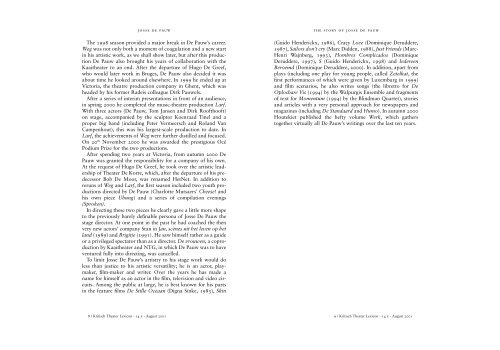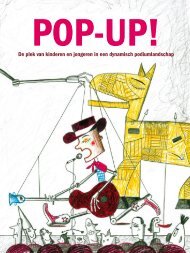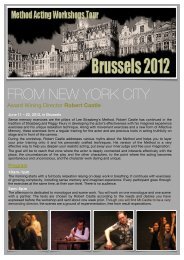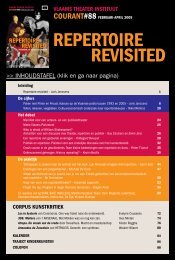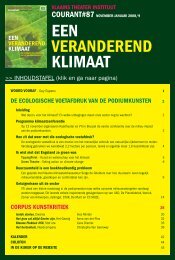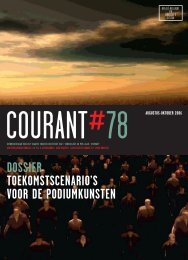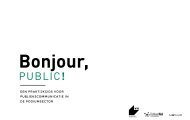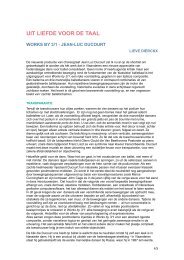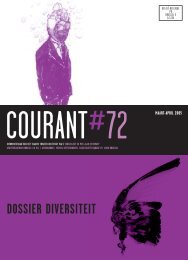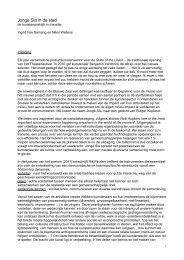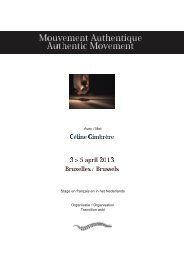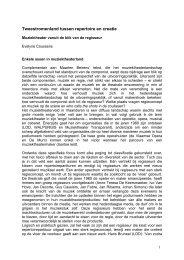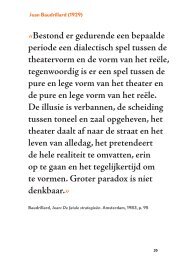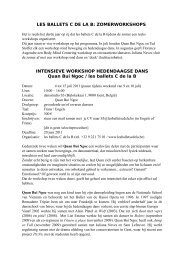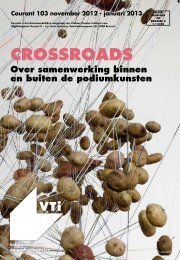You also want an ePaper? Increase the reach of your titles
YUMPU automatically turns print PDFs into web optimized ePapers that Google loves.
josse de pauw<br />
The 1998 season provided a major break in <strong>De</strong> <strong>Pauw</strong>’s career.<br />
Weg was not only both a moment of coagulation and a new start<br />
in his artistic work, as we shall show later, but after this production<br />
<strong>De</strong> <strong>Pauw</strong> also brought his years of collaboration with the<br />
Kaaitheater to an end. After the departure of Hugo <strong>De</strong> Greef,<br />
who would later work in Bruges, <strong>De</strong> <strong>Pauw</strong> also decided it was<br />
about time he looked around elsewhere. In 1999 he ended up at<br />
Victoria, the theatre production company in Ghent, which was<br />
headed by his former Radeis colleague Dirk <strong>Pauw</strong>els.<br />
After a series of interim presentations in front of an audience,<br />
in spring 2000 he completed the music-theatre production Larf.<br />
With three actors (<strong>De</strong> <strong>Pauw</strong>, Tom Jansen and Dirk Roofthooft)<br />
on stage, accompanied by the sculptor Koenraad Tinel and a<br />
proper big band (including Peter Vermeersch and Roland Van<br />
Campenhout), this was his largest-scale production to date. In<br />
Larf, the achievements of Weg were further distilled and focused.<br />
On 20 th November 2000 he was awarded the prestigious Océ<br />
Podium Prize for the two productions.<br />
After spending two years at Victoria, from autumn 2000 <strong>De</strong><br />
<strong>Pauw</strong> was granted the responsibility for a company of his own.<br />
At the request of Hugo <strong>De</strong> Greef, he took over the artistic leadership<br />
of Theater <strong>De</strong> Korre, which, after the departure of his predecessor<br />
Bob <strong>De</strong> Moor, was renamed HetNet. In addition to<br />
reruns of Weg and Larf, the first season included two youth productions<br />
directed by <strong>De</strong> <strong>Pauw</strong> (Charlotte Mutsaers’ Cheese! and<br />
his own piece Ubung) and a series of compilation evenings<br />
(Sproken).<br />
In directing these two pieces he clearly gave a little more shape<br />
to the previously barely definable persona of Josse <strong>De</strong> <strong>Pauw</strong> the<br />
stage director. At one point in the past he had coached the then<br />
very new actors’ company Stan in Jan, scènes uit <strong>het</strong> leven op <strong>het</strong><br />
land (1989) and Brigitje (1991). He saw himself rather as a guide<br />
or a privileged spectator than as a director. <strong>De</strong> vrouwen, a coproduction<br />
by Kaaitheater and NTG, in which <strong>De</strong> <strong>Pauw</strong> was to have<br />
ventured fully into directing, was cancelled.<br />
To limit Josse <strong>De</strong> <strong>Pauw</strong>’s artistry to his stage work would do<br />
less than justice to his artistic versatility; he is an actor, playmaker,<br />
film-maker and writer. Over the years he has made a<br />
name for himself as an actor in the film, television and video circuits.<br />
Among the public at large, he is best known for his parts<br />
in the feature films <strong>De</strong> Stille Oceaan (Digna Sinke, 1983), Skin<br />
8/ Kritisch Theater Lexicon - 14 e - August 2001<br />
the story of josse de pauw<br />
(Guido Henderickx, 1986), Crazy Love (Dominique <strong>De</strong>ruddere,<br />
1987), Sailors don’t cry (Marc Didden, 1988), Just Friends (Marc-<br />
Henri Wajnberg, 1993), Hombres Complicados (Dominique<br />
<strong>De</strong>ruddere, 1997), S (Guido Henderickx, 1998) and Iedereen<br />
Beroemd (Dominique <strong>De</strong>ruddere, 2000). In addition, apart from<br />
plays (including one play for young people, called Zetelkat, the<br />
first performances of which were given by Luxemburg in 1999)<br />
and film scenarios, he also writes songs (the libretto for <strong>De</strong><br />
Oplosbare Vis (1994) by the Walpurgis Ensemble and fragments<br />
of text for Momentum (1994) by the Blindman Quartet), stories<br />
and articles with a very personal approach for newspapers and<br />
magazines (including <strong>De</strong> Standaard and Humo). In autumn 2000<br />
Houtekiet published the hefty volume Werk, which gathers<br />
together virtually all <strong>De</strong> <strong>Pauw</strong>’s writings over the last ten years.<br />
9/ Kritisch Theater Lexicon - 14 e - August 2001


